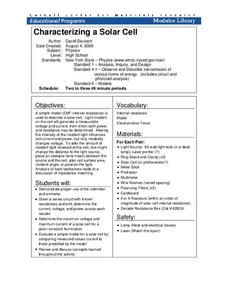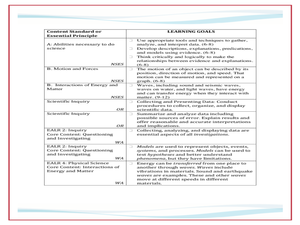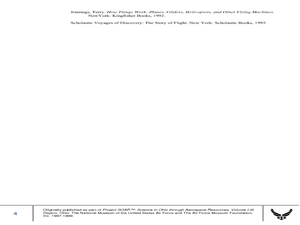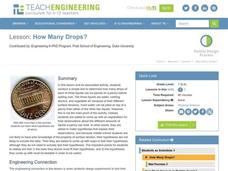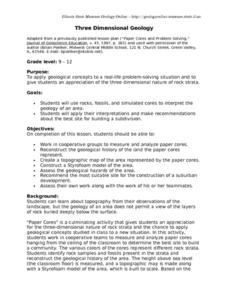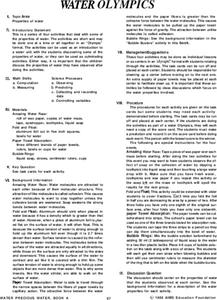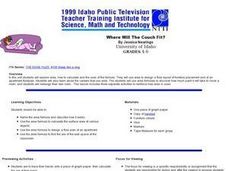Cornell University
Characterizing a Solar Cell
Young classes are sure to get a charge out of this instructional activity! Learners experiment with circuits of a solar cell. They practice determining current, voltage, and power for the circuit and maximize the voltage and current of...
Curated OER
New Boxes From Old
Students find the volume and surface area of a rectangular box (e.g., a cereal box), and then figure out how to convert that box into a new, cubical box having the same volume as the original. As they construct the new, cube-shaped box...
Curated OER
Water Pollution Lesson Plan: All Messed Up
Students map and calculate the area of the school parking lot and then the volume of water falling on the school parking lot. They map the route surface runoff will take to the nearest water body and describe the roles that human...
Curated OER
Conditions at Sea Introductory Activity, Making Waves
Students explore waves and wind. In this physical and earth science wave instructional activity, students participate in a wave making activity with an aquarium and a hair dryer. Students complete a data chart recording wave height and...
Curated OER
Tricky Traps
Students create identify properties of trapezoids. In this geometry lesson, students calculate the area of given trapezoids and review the area formula for parallelograms. They draw a correlation between the area of a trapezoid and that...
Curated OER
Parachutes: Is it Surface Area or Shape?
Young scholars investigate how to make a good parachute. In this physics activity, students observe the motion of parachutes as it falls and measure the time. They collect data and calculate the average descent time for each canopy shape.
Curated OER
Dilations of 2 and 3 dimentional figures and their effect on area, surface area, and volume.
Seventh graders investigate the area and volume of 2D and 3D figures. In this geometry lesson, 7th graders create a storyboard explaining their knowledge of 2D and 3D shapes. They analyze their data and interpret their results.
University of Wisconsin
Rain Garden Species Selection
The activity really comes to life within its intended unit on starting a rain garden. Working in groups, participants research native plants and coordinate them with the conditions in the designated garden area. Give the class access to...
Forest Foundation
Forest Watersheds
Where does the water we use come from? To understand the concept of a watershed, class members study the water cycle and then engage in an activity that simulates a watershed.
Curated OER
Graphing the Facts
Students investigate the correlation between our planet's weather and solar activity. They analyze and discuss data regarding the solar activity cycle, graph annual precipitation and temperature averages over a period of 100 years, and...
Illustrative Mathematics
Shape Hunt Part 1
The hunt is on! Send young mathematicians on a search for shapes in the first lesson of this two-part series. Each time a child finds a hidden shape, he draws it on his paper, and continues searching for the rest. Perform this activity...
Curated OER
Tour of the Frozen Ground
Young scholars discuss and observe permafrost features in their local community and compare and contrast these features with those described in a novel. In this permafrost lesson, students invite an elder from their community to discuss...
Curated OER
How Many Drops?
Seventh graders hypothesize about the number of drops of liquid that can be placed on a penny before it spills over. They examine both the concept of devising a hypothesis and the idea of surface tension. They determine the difference...
Curated OER
Identifying Pennsylvania Watersheds
Ninth graders study and identify the six major drainage systems in Pennsylvania. In this watershed lesson students read an article, complete an activity and take a quiz on what they learned.
Curated OER
Three Dimensional Geology
Here is a fine lesson plan on geology designed for high schoolers. Learners use rocks, fossils, and other geological clues to determine the geology of an area. Then, they make recommendations to a fictitious city council about the...
Curated OER
Water Olympics
A fascinating and engaging lesson on the properties of water awaits you. In it, learners engage in four activities that are designed to teach about the properties of water. This exciting plan has worksheets embedded in it which make the...
Curated OER
Design-a-Lesson-Packaging a Product
Students in a teacher education class address consumer related issues involving packaging. Using volume, surface area and graphs, they create a package for a given volume of a product. They design modifications for this lesson and to...
Curated OER
Traditional American Indian Lodges
Students explore the mathematical properties of traditional American Indian lodges. They examine the effect of increasing sides of a polygon, calculate the surface area of prisms and cylinders, and construct a classroom size pyramid...
Alabama Learning Exchange
Effects of Friction on a Moving Block
Learners investigate how friction affects the movement of a block across surface areas. They test five different kinds of surfaces—smooth surface, wax paper, a paper towel, course, and fine sandpaper. They predict and record the results...
Curated OER
Where Will The Couch Fit?
Students name the area formula and describe how it works. They use area formula to calculate the surface area of various objects. They use the area formula to design a floor plan of an apartment.
Curated OER
How Bright are the Stars?
Students observe the brightness of stars and are introduced to the concept of apparent brightness as a measure of how much light hits a detector of a surface area during a given time. In this star instructional activity, students make...
Curated OER
Baseball Geometry
Students apply various methods for finding the volume and surface area of sphere. They compare and contrast results among these mathematical methods. They work in cooperative groups to discuss their results with one another.
Curated OER
Seismic Waves
Students identify the four types of seismic waves, their characteristics and effects. Then they predict the level of damage each wave might cause in a residential area and test their predictions against several computer animations. ...
Curated OER
Polydron Fun
Students investigate nets as they relate to volume and area. In this geometry lesson, students use nets as a visual to deepen their understanding of surface area and volume of objects. They make conjectures about different objects and...


